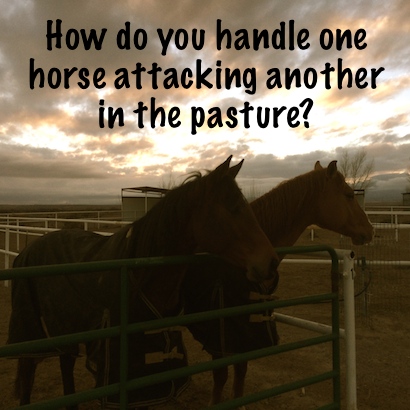“I’m having an issue today. I need help if you find a moment. I have 7 horses turned out together. They have ALL lived together for at least a year. Today, I blanketed two if them due to incoming inclement weather. One has a cold and the other was clipped and hasn’t re-grown his coat as well as we hoped. My problem is, the non-blanketed horses are attacking the two with blankets. Not a little either. They are full out ATTACKING. Pawing, rearing biting, kicking . It’s rough. What can I do?”-Patti C.
 Horses have an interesting way of viewing things…don’t they? The easiest and quickest suggestion is to separate them for now. Depending on your set up you could pasture them in view of each other which will also allow the non-blanketed horses to adjust to seeing their friends wearing blankets.
Horses have an interesting way of viewing things…don’t they? The easiest and quickest suggestion is to separate them for now. Depending on your set up you could pasture them in view of each other which will also allow the non-blanketed horses to adjust to seeing their friends wearing blankets.
Once things calm down a bit you can also do some retraining. Be creative and remember to stay safe. Retraining could take many forms including: a shared fence line to let the horses adjust, stalling blanketed and non-blanketed near each other, tying the aggressive horses and allowing the other horses to move around, the list can get longer depending on how creative you are and what type of set up you have to work with. The following comment is from another blog about horses that were aggressive during group feeding. Listen to how Ashley B. solved her problem:
3 Comments
-
you could also spray a light coat of vinegar on the outside of the blankets. the attacking horses will not like the taste of the sprayed vinegar. Vicks might work also. just try a little bit at a time.
-
Had a friend’s gelding that hated a mare and would attack her viciously. I fastened a dog-training (shocking) color around his neck with some odds of straps. When he attacked I pressed the button. Years ago. I think it took only 2 sessions and he left her alone.
-
be very careful doing this type of “training” for aggressive horses bad habits; a horse can not tolerate a very high voltage of electric shock, even though it is “battery” operated, very dangerous, especially if it is rainy or damp weather conditions. <3
good idea, just be very careful of the weather when you do.
-
Leave a Comment

FREE PDF DOWNLOAD
WHY IS MY HORSE...?
100% Private - 0% Spam
No one taught you the skills you need to work through these things.
Riders often encounter self-doubt, fear, anxiety, frustration, and other challenging emotions at the barn. The emotions coursing through your body can add clarity, or can make your cues indistinguishable for your horse.
Learning these skills and begin communicating clearly with your horse.
Click here to learn more.

Generally, horses eventually get over the shock of seeing the other horses with blankets but the important part is to keep everyone safe during this transition period.